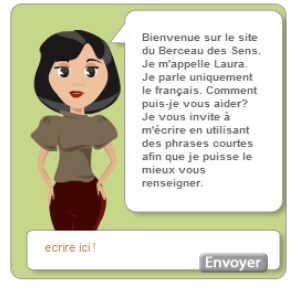 Research conducted by Ecole hôtelière de Lausanne (EHL) monitored what happened when a virtual agent was introduced to the website of it restaurant ‘Berceau des Sens’. We developed ‘Laura’ with the help of a computer service company named Askom. Laura is able to answer frequently asked questions, such as on menus and prices, making bookings, restaurant location, and opening hours; together with some more tricky queries, such as on children’s or special menus, and parking and Wi-Fi availability.
Research conducted by Ecole hôtelière de Lausanne (EHL) monitored what happened when a virtual agent was introduced to the website of it restaurant ‘Berceau des Sens’. We developed ‘Laura’ with the help of a computer service company named Askom. Laura is able to answer frequently asked questions, such as on menus and prices, making bookings, restaurant location, and opening hours; together with some more tricky queries, such as on children’s or special menus, and parking and Wi-Fi availability.
The results are convincing. Humanising the site in this way proved to be key to developing positive visitor emotions and increasing their desire to subsequently visit the restaurant. And not only was Laura perceived to be fun, she was also found to be useful, interesting, and easy to understand.
Here’s a breakdown of the findings:
- Informational fit-to-task: When asked whether the information on the website was useful, and whether the site addressed their information needs, visitors were significantly more positive about the content of the site when Laura was present.
- Tailored communication: The presence of Laura made visitors judge the website to be more personalised and tailored to their needs, possibly because of the empathy that can be experienced by communicating with a ‘human being’.
- Visual appeal: When asked whether the home page was attractive and made the visitors want to browse the rest of the website, or whether the design of the website was visually pleasing, with Laura on the scene visitors were a great deal more favourable in their responses.
- Innovativeness: Visitors judged the site to be more creative and unique with the presence of Laura.
- Emotional appeal: This dimension also measured more positively with Laura employed, suggesting opportunities for businesses to use virtual agents to better develop relationships with potential customers online, improve the memorability of their businesses, and, in turn, increase word of mouth endorsements.
- Ease of use: Laura was perceived to greatly improve the usability of the website, in terms of ease of access to information. Her ability to immediately respond to questions reduced visitors’ perception of time-wastage and made the website seem easier to use.
- Relative advantage: We also asked users to compare the relative advantage of using Laura to using other standard communications channels. Results indicate that with the presence of Laura, clients will prefer to use this channel to interact with the company instead of writing an email and/or calling.
- Trust: We found that as far as trust is concerned, that is, the confidence that the web-users can have in the accuracy of the information on the website, there is no significant difference with the presence of Laura. Insomuch as there is a difference, it is that the trust level of respondents is higher without the presence of Laura.
As conclusion, one can claim that the degrees of usefulness and enjoyment perceived by web-users interacting with the virtual agent have a significant influence on their desire to have a ‘real-life’ experience in the restaurant. This research can help not only restaurant/hotels managers, but also general marketing practitioners in their desire to manage relationships with current and potential clients through their website.


